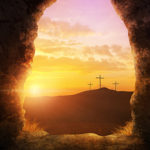A close friend recently confided about the difficulty of preaching on Easter: “Jesus rose from the grave. He did it last year, and he’ll do it again next year. The people who attend church on Easter all know the story.”
In the context of Christmas and Easter, familiarity with the stories of Jesus’ life doesn’t exactly breed contempt, but something more like boredom. Before worshippers arrive at church on Christmas Eve and Easter, they already know what the pastor is going to say. The irony of packed church sanctuaries on these two dates is that so many people who only attend worship twice a year seem to think the preacher always talks about the same thing. Still, they arrive for their semi-annual spiritual inoculations—receiving just enough religion to prevent them from catching the real thing—and leave stone bored because everything was “the same as last year.”
Even though the Easter Sunday church crowd knows “the rest of the story,” most Americans still don’t get it. A recent survey reveals the majority don’t link Easter to the Resurrection of Jesus. Most vaguely reference Easter as a religious holiday, but only 42 percent connect the theological dots between Easter and the Resurrection. (Our article about the survey is located here .)
Of course, Christmas receives far more attention than Easter. The Baby Jesus, angels, shepherds, wise men and a huge star present a much more winsome picture to the religiously wary than do betrayal, beatings, denial, suffering and death. People instinctively prefer a cuddly Christchild to a scourged Savior. Besides, Easter is much more theologically complicated than Christmas. People warm to the innocence of a miracle-born baby, even if they don’t know why or how he arrived. But a full-grown carpenter-turned-rabbi whose death makes an eternal difference in our lives? Not so much.
Easter is about victory over death. Divine righteousness, holiness and justice demand payment for human sin, which is ultimate death—eternal separation from God. But divine love, grace and compassion bear the cost of our sin. In Easter, “God was reconciling the world to himself in Christ, not counting men’s sins against them. … God made him who had no sin to be sin for us, so that in him we might become the righteousness of God” (2 Corinthians 5:19, 21).
The older I get, the more interested in Easter I become. One reason is because I ever-more-completely comprehend my own sinful brokenness and need for Easter grace. Another reason is because I more fully understand a parents’ unconditional love and want to reciprocate my divine Parent’s love. And still another reason is because more and more people I love now abide in heaven, and I look toward the day Easter makes possible—reunion.
For these and other reasons, we must proclaim Easter’s truth. In Easter, we celebrate Jesus’ ultimate victory over death and the possibility to enjoy eternal life with God and with those believers whom we love.
But we also should proclaim the here-and-now blessings and benefits of Easter for at least two important reasons.
First, you can’t scare many people out of hell and into heaven. Most Americans think they’re “pretty good” people—good enough to go to heaven when they die. They’ve got rusty receptors when it comes to receiving Easter truth. They aren’t buying the notion they’re sinful enough to go to hell, and they don’t believe God would send them there, anyway. This doesn’t mean we shouldn’t proclaim the truth, but don’t be surprised when they can’t comprehend it.
Sign up for our weekly edition and get all our headlines in your inbox on Thursdays
Second, the here-and-now blessings of Easter are more tangible. Millions of Christians testify that their relationship to God—made possible by Jesus, by Easter—gives them the confidence, courage and conviction to live lives of serenity, purpose and peace. So, each day is Easter, as they arise as a newborn creature, a loved and forgiven child of God.
Marv Knox is editor of the Baptist Standard. Visit his FaithWorks Blog.














We seek to connect God’s story and God’s people around the world. To learn more about God’s story, click here.
Send comments and feedback to Eric Black, our editor. For comments to be published, please specify “letter to the editor.” Maximum length for publication is 300 words.